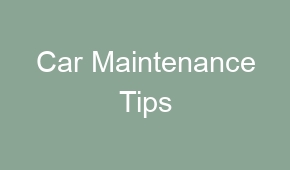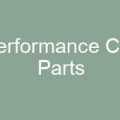Car Maintenance Tips

Proper car maintenance is crucial for optimal performance and longevity. Regularly check fluids, replace filters, inspect tires, and schedule professional inspections.
Car maintenance tips are essential for keeping your vehicle running smoothly and prolonging its lifespan. Regularly checking and changing your oil and filters can prevent engine damage. It’s important to inspect your tires for wear and rotate them regularly to ensure even tread wear. Brake pads should be checked and replaced if necessary to maintain optimal stopping power. Regularly cleaning and waxing your car can protect the paint and prevent rust. Lastly, scheduling routine vehicle inspections can catch potential issues before they become major problems. Following these car maintenance tips will help you avoid costly repairs and keep your car in top condition.
| Regular oil changes help extend the life of your car. |
| Check your tire pressure regularly for better fuel efficiency. |
| Rotate your tires every 5,000 to 8,000 miles for even wear. |
| Inspect and replace worn brake pads to ensure proper braking. |
| Keep your car clean to prevent rust and maintain its appearance. |
- Inspect and replace your air filters regularly for optimal engine performance.
- Check your fluid levels, including coolant and brake fluid, for proper functioning.
- Replace windshield wipers every 6-12 months for clear visibility.
- Listen for any unusual noises and address them promptly to prevent further damage.
- Get regular vehicle inspections to detect potential issues early on.
What are some essential car maintenance tips for prolonging the lifespan of your vehicle?
Regularly check and change the car’s oil, filters, and fluids to ensure optimal performance. Keep tires properly inflated and rotate them regularly. Maintain a clean air filter and replace it when necessary. Regularly inspect the brakes and change brake pads as needed. Keep the car’s exterior clean and waxed to protect the paint and prevent rust. Follow the manufacturer’s recommended maintenance schedule for tune-ups and inspections.
How can you ensure your car’s engine stays in good condition?
Regularly check the oil level and quality and change it according to the manufacturer’s recommendations. Keep the engine clean and free of debris. Use high-quality fuel and add fuel additives as recommended. Avoid excessive idling and revving the engine. Regularly inspect and replace spark plugs and ignition wires. Pay attention to any unusual noises or vibrations and address them promptly.
What are some tips for maintaining your car’s battery?
Keep the battery terminals clean and free of corrosion. Check the battery’s water level and add distilled water if necessary. Avoid leaving lights or accessories on when the engine is off. Regularly test the battery’s voltage and replace it if it’s not holding a charge. In extreme weather conditions, use a battery blanket or heater to protect the battery.
How can you prevent overheating in your car’s engine?
Regularly check the coolant level and add coolant as needed. Inspect the radiator for any leaks or damage. Keep the radiator fins clean and free of debris. Ensure the radiator fan is functioning properly. If the engine starts to overheat, turn off the air conditioner and turn on the heater to help dissipate heat.
What are some tips for maintaining your car’s tires?
Regularly check the tire pressure and inflate them to the recommended level. Inspect the tires for any signs of wear or damage. Rotate the tires regularly to ensure even wear. Keep the tires properly aligned and balanced. Avoid abrupt braking and acceleration, as it can cause excessive wear on the tires.
How can you keep your car’s interior clean and well-maintained?
Vacuum the interior regularly to remove dirt and debris. Use appropriate cleaners for different surfaces, such as upholstery, dashboard, and carpets. Avoid using harsh chemicals that could damage the interior. Protect the seats with seat covers or upholstery protectors. Keep the car’s interior well-ventilated to prevent odors and mold growth.
What are some tips for maintaining your car’s brakes?
Regularly inspect the brake pads and replace them if they are worn out. Pay attention to any squealing or grinding noises when braking. Have the brake fluid flushed and replaced as recommended. Avoid excessive braking and use engine braking when possible. Keep the brake rotors clean and free of debris.
How can you prevent rust on your car’s body?
Regularly wash and wax the car’s exterior to protect the paint from moisture and oxidation. Repair any paint chips or scratches promptly to prevent rust from forming. Avoid driving on salted roads or wash the car afterwards to remove salt residue. Apply rust-proofing treatments to vulnerable areas.
What are some tips for maintaining your car’s air conditioning system?
Regularly check and clean the air filters to ensure proper airflow. Have the refrigerant level checked and topped up if necessary. Run the air conditioner regularly, even in winter, to keep the system lubricated. Address any strange odors or weak airflow promptly. Have the system serviced by a professional regularly.
How can you maintain your car’s windshield for optimal visibility?
Regularly clean the windshield both inside and outside to remove dirt, grime, and bugs. Replace worn or damaged wiper blades for efficient wiping. Use a high-quality windshield washer fluid to clear away debris. Park the car in shaded areas to prevent sun damage to the windshield.
What are some tips for maintaining your car’s suspension system?
Regularly inspect the suspension components for any signs of wear or damage. Have the suspension aligned and balanced as recommended. Avoid driving over potholes and rough roads whenever possible. Address any unusual noises or vibrations promptly. Replace worn-out suspension parts as needed.
How can you maintain your car’s headlights for optimal visibility?
Regularly clean the headlights to remove dirt, grime, and oxidation. Use a headlight restoration kit for more severe oxidation. Check the alignment of the headlights and adjust if necessary. Replace any burnt-out bulbs promptly. Use high-quality bulbs for better visibility.
What are some tips for maintaining your car’s electrical system?
Regularly check the battery connections and clean them if necessary. Inspect the wiring for any signs of damage or corrosion. Keep the electrical system dry and protected from moisture. Avoid overloading the electrical system with excessive accessories. Have the alternator and starter tested regularly.
How can you maintain your car’s fuel efficiency?
Keep the tires properly inflated and aligned. Avoid excessive idling and aggressive driving. Use the recommended grade of motor oil. Keep the air filter clean and replace it when necessary. Remove excess weight from the car. Combine errands to minimize the number of trips.
What are some tips for maintaining your car’s exhaust system?
Regularly check the exhaust system for any leaks or damage. Have the catalytic converter inspected and replaced if necessary. Use high-quality fuel to minimize carbon buildup. Avoid driving on rough roads that can damage the exhaust system. Address any unusual noises or smells promptly.
How can you maintain your car’s transmission for optimal performance?
Regularly check the transmission fluid level and quality and replace it as recommended. Avoid excessive towing or carrying heavy loads. Have the transmission serviced by a professional regularly. Address any signs of slipping, rough shifting, or unusual noises promptly. Use the correct transmission fluid for your vehicle.
What are some tips for maintaining your car’s cooling system?
Regularly flush and refill the coolant as recommended by the manufacturer. Inspect the radiator hoses for any signs of wear or leaks. Keep the radiator fins clean and free of debris. Check the radiator cap for proper sealing. Have the cooling system pressure tested regularly.
How can you maintain your car’s power steering system?
Regularly check the power steering fluid level and condition and top it up if necessary. Inspect the power steering belt for any signs of wear or damage. Have the power steering system flushed and serviced as recommended. Address any unusual noises or difficulty in steering promptly.





















